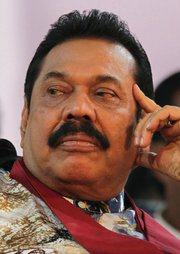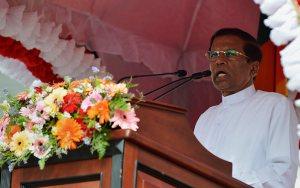
Rajapaksa
I have written before about Sri Lanka’s vile President Mahinda Rajapaksa. Yet another example of how power corrupts. Together with his band of brothers he was well along toward thoroughly undoing Sri Lanka’s democracy, and establishing a repressive authoritarian regime. The Rajapaksa boys were using the time-honored method of crushing any opposition or dissent through every means possible ranging from abuse of legal process to outright murder.
Last time, the big hero of Sri Lanka’s recent civil war tried to run against Rajapaksa, but was easily seen off and jailed for his trouble. Rajapaksa must have been pretty cocky because he decided to advance the next election by two years; no credible opponent was on the horizon, and Rajapaksa, controlling the vast resources of the government to propagandize, did seem impregnable.
But then his former health minister, Maithripala Sirisena, defected to run against him, on a shoestring. And – despite the incumbent’s overwhelming advantages – a huge shocker, Rajapaksa was beaten by a margin sufficiently decisive that he didn’t even try to tough it out.

Sirisena
Sirisena says that what Sri Lanka needs is “not a king, but a real human being.” Taking office quickly, he’s already dismantling some of Rajapaksa’s instrumentalities of repression, like blocked websites, and surveillance. Rajapaksa looks likely to be prosecuted now for his abuses, and headed for prison.
This is an absolutely thrilling thing. I’m reminded of Lincoln’s famous line that you can’t fool all the people all the time. Despite the intensive propagandizing by the Rajapaksa regime, the Sri Lankans – at least a majority – could see through it, and were smart enough to reject it. So much for the oft-invoked conventional wisdom that Asians are somehow culturally comfortable with authoritarianism.
Of course history never runs neatly, and things may well get messy in Sri Lanka. But the big fact is that its democracy has now been rescued, by its citizens, from a grave threat. People do understand the value of a democratic society, and will act on that understanding. This was a good day for optimists, and a bad one for cynics.

